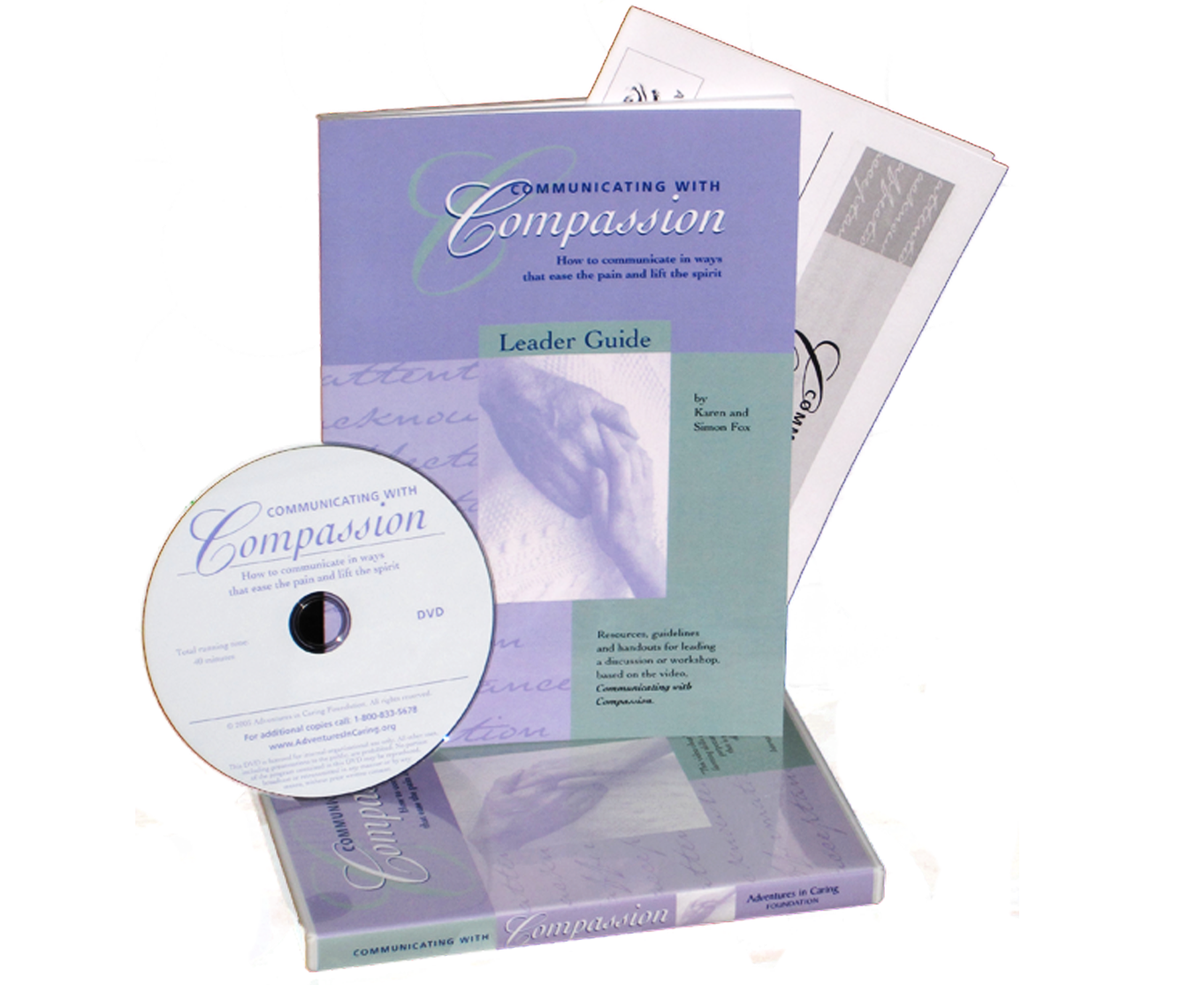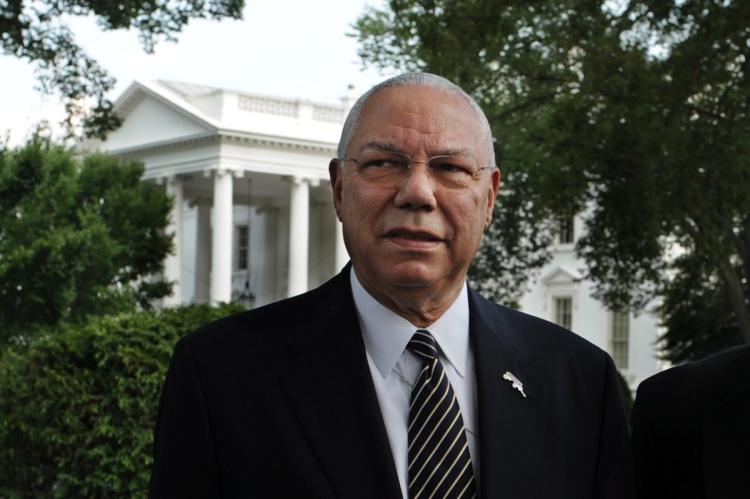Resources for Inspiring Compassion
Practical Tools for Leaders to
Introduce and Inspire Compassion
Gifted caregivers do something more than give assistance or information—they bring the presence of compassion to those who suffer.
You can cultivate this ability in your team using these ready-made, video-based programs to:
- Make compassion visible. Put the topic on the table in a non-threatening way.
- Set a standard and build confidence in new caregivers by showing real life examples of volunteers in action demonstrating exactly how to communicate with compassion.
- Set the stage for great meetings. Group leaders, mentors and instructors use these videos as starting points for stimulating discussions and inspiring workshops.
An ideal resource for:
• Caregiving Ministries • Hospices • Hospital Auxiliaries • Family Caregivers • Seminaries • Service Clubs
Volunteer Kimberlee recounts her first visit.
The two video-based programs (below) come with inspiring documentary-style videos, detailed leader’s guides, and handouts for your audience.
Everything you need to lead a session that engages and inspires your audience, whether you are a new or experienced group leader.
In this inspiring, best-selling video-based program, Karen Fox and her team show how to treat the sick, injured, and dying with compassion. They demonstrate the four things that must happen in conversation for a person who is suffering to experience compassion.
These are the fundamental skills needed to build a bridge to the other person’s world, to get compassion across.
Karen and her team vividly demonstrate, with beauty and humor, in real life situations, how anyone can learn to empower, encourage, bring hope, and lift the spirit.
This sequel to Communicating with Compassion shows how compassion is applied to resolve tough conversations.
The program features a wide variety of caregivers interacting with real patients in real life, in entirely candid unscripted scenes. The emotions are real!
Your audience learns how to:
- Turn a difficult conversation into a discovery conversation.
- Identify three layers of a difficult conversation.
- Recognize pivotal moments when conversations can turn around.
- Build stronger healing partnerships despite the difficulties.
A handy little book that fits in your purse or back pocket. For family and volunteers to find the right words and actions that bring most comfort to those who are suffering.
Learn how to:
- Avoid the most common mistakes made when visiting the sick.
- Cope with the emotions of illness and healing.
- Convery the four elements of compassion used by gifted healiers.
- Find resources for healing and support
- Transform somene’s darketst hour into a time of healing.
“I applaud your efforts to teach volunteers how to interact with people who are suffering… I did view the video and the program is obviously a labor of love on your part… I am sharing your work with my staff, especially those involved in finding ways for young people to serve their community and fellow citizens.”
Colin L. Powell, General, U.S. Army
Chairman, America’s Promise
Volume #1
Communicating with Compassion
How to Communicate in Ways that Ease the Pain and Lift the Spirit
Founder of Adventures in Caring, Karen Fox explains a step-by-step method for communicating with people who are ill, injured, isolated, or in distress. Karen demonstrates, using real situations, four key communication skills that empower, encourage, bring hope, and lift the spirit.
 “Teaching compassion is different than teaching how to change the oil in your car, or use a new computer. For this, and other reasons, it has often been discarded from medical training, and is today frequently thought of as a frill, a nice, but unessential element. Yet, throughout history compassion has been the universal solvent, the key ingredient to true healing”.
“Teaching compassion is different than teaching how to change the oil in your car, or use a new computer. For this, and other reasons, it has often been discarded from medical training, and is today frequently thought of as a frill, a nice, but unessential element. Yet, throughout history compassion has been the universal solvent, the key ingredient to true healing”.
Simon Fox, Executive Producer
The Medicine of Compassion

This package includes:
- 45-minute DVD or VHS-tape.48-page Leader Guide with instructions on how to use the video as the basis for a 60-minute or 90-minute class, or for a 3-hour workshop.
- To custom-design your own class additional discussion questions, class exercises, and video index are included, plus resources for continued learning and suggestions for measuring progress.
- Handouts – formatted for easy copying. Three pages summarize the essential points of the video and expand upon them.
- Beautiful production, original musical score and real-life scenes.
Preview of Communicating with Compassion.
Throughout history, compassion, caring, and love have been the foundation of healing. Without them, medical science and technology are inadequate. The Medicine of Compassion reminds us that these factors remain crucial in health care, as the greatest healers have always known.
Communicating with Compassion is a quality program. I find it valuable in refining the skills of supportive presence needed by lay volunteer and clergy alike. It is a complete package, educationally sound and stimulating to use. This one is a keeper!
The best educational resource I have ever seen for teaching compassion. It’s inspiring, and shows exactly how to give the psychosocial support that patients need. Everyone in the health professions should see this video.
I was impressed by how the film spoke to such a wide variety of people. Students and nurses aids easily understand the material, yet medical doctors also find it valuable.
Anyone who wants to increase their ability to communicate with compassion, empathy and caring, will benefit from this video. Communicating with Compassion is a special blend of practical know-how and sensitivity to the unique needs of individuals who are ill. It is a “must see” for all health care providers
This video is one of the most outstanding training tools for staff and volunteers that I have ever seen. I know I’ll be using it often
As I reflect on the widespread need in our frantic, fractured society for people with a healing touch, I cherish a fervent hope that this resource will become available to the countless people who could use it to learn how to enhance their caring attitudes and skills.
An artistic and uplifting video that gives us the tools to enhance the lives of those who are suffering, from whatever cause.
Your video touches both the head and the heart. It flows and the teaching points are made so naturally. I cried at several places. Thank you for an effective and beautiful video.
Communicating with Compassion is by far the best teaching tool I could use in the area of listening and communication skills. Thank you for your great effort to teach us all that compassion is the key element to a healing encounter.
When I saw Communicating with Compassion it was love at first sight. I use it with new trainees and at monthly in-service meetings. This video is an education for the heart as well as the head.
A genuinely touching piece of work – it goes right to the heart. I have all staff view it on a regular basis and prn in times of stress or despair. This video is a powerful reminder of the human component in patient care.
 According to Karen and Simon Fox, the best way to teach compassion is not to teach, but to inspire through real-life situations. Just as Adventures in Caring’s volunteers have learned their skills from personal experiences, the camera follows doctors, nurses and caregivers into their world of real situations, real challenges, real emotions. Wisdom is shared, like bread between souls. The perspective that Karen had found is reflected in the lens of our cameras. We have no agenda only insights to offer. Insights earned over many, many years of challenges and grace.
According to Karen and Simon Fox, the best way to teach compassion is not to teach, but to inspire through real-life situations. Just as Adventures in Caring’s volunteers have learned their skills from personal experiences, the camera follows doctors, nurses and caregivers into their world of real situations, real challenges, real emotions. Wisdom is shared, like bread between souls. The perspective that Karen had found is reflected in the lens of our cameras. We have no agenda only insights to offer. Insights earned over many, many years of challenges and grace.
Our video starts by showing two very different worlds: the world of the busy health care professional and the anxious, uncertain world of the patient – and how compassion can form a bridge between the two worlds. It is odd to have to say it, but when compassion is present patients feel cared for. They receive and treat health care staff better and they in return experience greater satisfaction. Everybody knows this, but most are caught up in seemingly unextricable situations. This video and materials came from many real situations, even the few spoofs we made were not rehearsed. These moments now have something, not just to show, but to rekindle.
The course, including the video, offers your students the structure and time for reflection after viewing. The entire production of all AiC productions including original music over the past 30 years is the work of Bent Myggen and Simon and Karen Fox. Each scene is gently filmed real life – not re-enactments for the camera. Tender moments were graciously allowed to be filmed as wisdom was shared. Many, who have watched this video also discovered something important about themselves.
We hope this video will the beginning of many magical encounters.
Volume #2
Compassion in Action
Compassion when the going gets tough—being effective in emotionally difficult situations
“Compassion comes naturally when people are suffering. But what about when those people are upset or difficult to be with? Is it possible or practical to extend compassion when the going gets tough?
 Compassion in Action shows the art of communicating with patients when difficult emotions arise. Using real-life footage from authentic situations, the video gives a fresh look at an age old problem: How to keep caring when patients are difficult. Viewers learn new approaches and gain confidence, encouragement and motivation for being effective in difficult interactions”
Compassion in Action shows the art of communicating with patients when difficult emotions arise. Using real-life footage from authentic situations, the video gives a fresh look at an age old problem: How to keep caring when patients are difficult. Viewers learn new approaches and gain confidence, encouragement and motivation for being effective in difficult interactions”
The Medicine of Compassion
Scene from Compassion in Action
This course gives teams the tools to discuss, debrief, and deal with the more challenging side of caregiving. A seminar for new caregivers, a refresher for those with experience, and a valuable tool for everyone who champions the cause of compassion in health care. Beautiful production, original musical score and real-life scenes.

The sense of revelation that I and my colleagues had while watching this video – what a learning experience! I was moved to tears by one particular scene. I hope all new caregivers see this video, to see the ideal applied to the real. I wish all experienced caregivers could see it to be reminded of why we do what we do – to give LOVE where it is needed most.
This package includes:
- 43-minute DVD with 12 chapters, each illustrating different communication challenges in caregiving.
- An optional introduction from the Executive Producer to give your audience a powerful context for your session.
- 128-page Leader Guide shows how to use the video as a starting point for a discussion or seminar. It includes a proven Five-Step Training Program to cultivate compassion using group dialogue, group exercises, individual practice and self-evaluation.
- Also included are seven discussions, a video time index, and elements to custom-design your own seminars with suggestions for a single one-hour class, a 2-4 hour seminar, or a series of seminars.
- 3 Handouts formatted for easy copying. Five pages summarize the essential points of the video and expand upon them for in-depth discussion and training.
- Access to website resources for continued learning, updates and new materials such as: additional handouts, visual aids, key links, discussion groups, and recommended reading.
- Handouts – formatted for easy copying. Three pages summarize the essential points of the video and expand upon them.
- Beautiful production, original musical score and real-life scenes.
What Participants learn:
Authentic examples of how experienced caregivers respond to patients who are:
Audiences learn how to:
- Turn a difficult conversation into a discovery conversation.
- Identify the three layers of a difficult conversation and find clues to the solution.
- Recognize the pivotal moments when conversations can turn around.
- Build strong caregiving partnerships despite the difficulties
- Uncooperative
- Afraid of losing their autonomy
- Confused
- Grieving
- Having unrealistic expectations
- Forgetful
- Unable to speak
- Argumentative
- Frustrated
- Angry
- Feeling sorry for themselves
- In a coma
- Dying Young

A Wonderful follow up to the The Medicine of Compassion. It stimulates a discussion on more complex situations where demostrating compassion can be difficult.
Compassion is often forgotten in the skill driven curriculums of nursing schools. This program brings some much-neede attention to the core of nursing. The scenarios were informative and genuine. Thank you for providing quality programs for nurses from every generation”
An insightful look at experts delivering emotionally supportive care to very difficult patients. A clear demonstration of the need for, and value of, compassion in health care.
What is so special and valuable about this video is seeing actual spontaneous reactions in real-time. They demonstrate and inspire the art of being present and observant
I love this video! It’s a wonderful, candid example of compassion at work in a variety of health care settings. It shows the humanity and joy we can find – even in the tougher situations – if we approach them in the right way.
Compassion in Action is a beautiful, practical demonstration of how to infuse difficult conversations with love.
An opportunity to see what a profound difference human caring makes in the lives of others! Real life situations show how to engage with others in a way that cares for their spirit, their emotions, their humanness. I will be using Compassion in Action as a teaching tool for professional and volunteer caregivers




